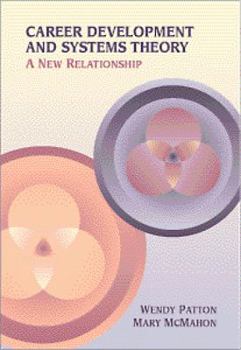Career Development and Systems Theory: A New Relationship
In a groundbreaking departure from traditional career counseling texts, authors Wendy Patton and Mary McMahon have developed a comprehensive book that uses General Systems Theory to unify the many... This description may be from another edition of this product.
Format:Hardcover
Language:English
ISBN:0534348130
ISBN13:9780534348137
Release Date:May 1998
Publisher:Cengage Learning
Length:287 Pages
Weight:0.95 lbs.
Dimensions:0.5" x 6.4" x 9.3"
Customer Reviews
1 rating
A good book for career theorists and counsellors
Published by Thriftbooks.com User , 20 years ago
The 1990s saw an attempt by many career theorists to integrate existing major theories of career into a unified theory, which proved to be a nearly impossible undertaking. Patton and McMahon's System Theory Framework is another recent attempt at convergence. Their approach is technically not a "theory" since it doesn't really predict anything; however, it does provide an extensive conceptual framework in which existing career theories can be placed, and the links between them examined. Their book gives a comprehensive description of their Systems Theory model, and how it was derived from previous career theories and systems theory literature.The first part of the book deals with existing career theories, and provides a well-written and comprehensive review of the major approaches of the past century, from the trait and factor theories of Parsons and Holland to the more recent social-cognitive, contextual and "post-modern" approaches to career development. The features of each theory are described briefly (but without too much oversimplification), and are compared and contrasted with those of other theories.Highlighting the absence of plausible influences on career development in existing theories sets the stage for the second part of the book, which describes how the Systems Theory was developed from the authors' earlier work on adolescent decision-making. The book then goes on to describe the actual framework, which conceives the individual as the central system, encompassing many subordinate systems (including differential factors such as interests, skills, values, age, etc.), and surrounded by systems representing contextual influences (e.g. the family, educational institutions, the employment market, etc.). The inclusion of each career influence and its assignment to a particular system is justified in light of previous theories and the authors' speculation about its probable importance.In the third part of the book, the changing work environment and the implications of systems theory for career counselling and education are discussed. Particularly interesting is its challenge to career counsellors' traditional approach of assessing clients and decreeing what kind of job would be most suitable for them. Instead, Systems Theory emphasises a partnership between the counsellor and client. Counsellors (or career development facilitators as they are termed in the book) are encouraged to help their clients see themselves as active lifelong learners, to become prepared for workplace change, to view their entire life from a systems perspective, and to use this understanding to prompt a creative and dynamic exchange with counsellors to facilitate their career development.One problem I had with the book was that, although it provides a very extensive taxonomy of possible influences on career development, it does not really show how these are connected; it simply conceptualises them as open systems that may, or may not, be permeated and influen





